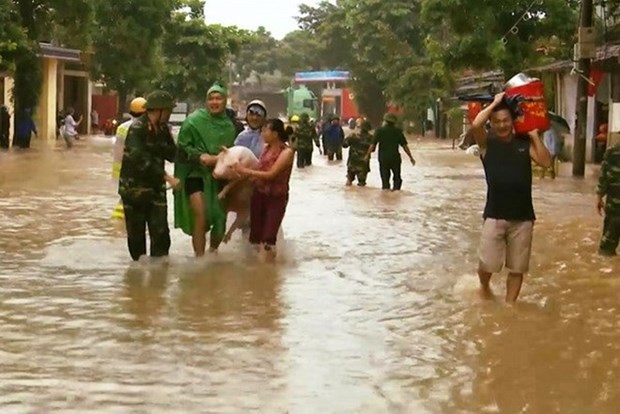Project helps provinces improve adaptation to climate change
Lessons learned from the strategic mainstreaming of ecosystem-based adaptation (EbA) was a good foundation for Vietnam to prepare for climate change, according to Dr. Nguyen The Chinh from the Natural Resources and Environment Strategic Institute.
 Illustrative image (Source: VNA)
Illustrative image (Source: VNA) Hanoi (VNA) - Lessons learned from
the strategic mainstreaming of ecosystem-based adaptation (EbA) was a
good foundation for Vietnam
to prepare for climate change, according to Dr. Nguyen The Chinh from the
Natural Resources and Environment Strategic Institute.
Chinh was speaking at a workshop on February 6 reviewing a project on the subject. It was held by the Institute for Strategy and Policy on Natural Resources and Environment in collaboration with the German Development Cooperation Agency. The event marked more than three years of productive collaboration.
The 4-million Euro (4.9 million USD) project funded by the German Society for International Cooperation (GIZ) worked with the Vietnamese Government to mainstream ecosystem-based measures into pilot models in Ha Tinh and Quang Binh provinces.
"After three years of implementation, the project evaluated the vulnerable ecological situation in Ha Tinh and Quang Binh provinces," Chinh said.
“The project also helped to set up a national plan of land use for 2016-2020, and an updated action plan for climate change preparedness until 2020 in the provinces,” he added.
The EbA project aims to support efforts in the strategic mainstreaming of ecosystem-based approaches into national policies on climate change adaptation, land-use and development planning.
EbA has been identified as an effective adaptation measure given that Vietnam is heavily affected by the adverse effects of climate change.
Climate change vulnerability assessments have been conducted at both provincial and commune levels to introduce appropriate EbA solutions for implementation in the selected provinces.
From 2016, the project began pilot EbA activities in coastal areas suffering erosion and sand movement in Quang Binh province by planting and rehabilitating coastal forests in combination with livelihood activities, such as cattle-raising, fresh- water fish farming, and vegetable cultivation.
In Ha Tinh, the project piloted EbA approaches in a mountain ecosystem under drought conditions, enriching natural forest by using indigenous plants, oranges and pineapples grown in contour lines - plus bee-raising.
The two areas selected for the pilot EbA approaches shared common characteristics. Firstly, the communities in both areas showed real enthusiasm to participate; and secondly, they lived in areas suffering from difficult economic conditions, with limited access to the technologies required for agricultural production.
Strengthening the capacity of stakeholders at central and local levels was a key aspect of the project.
To improve knowledge and the sharing of information on EbA measures and activities, the project organised a series of training workshops on mainstreaming them into the development planning process.
The project also focused on mainstreaming EbA into the climate-change-adaptation legal framework by supporting Government agencies. For example, the Department of Land Management will implement strategic environmental assessments to collect inputs for revising national land-use planning for 2016-2020; the Department for Planning Management will mainstream EbA and climate-change issues into developing the Planning Law; and the departments of Natural Resources and Environment of Ha Tinh and Quang Binh will mainstream EbA into the updated Provincial Climate Change Action Plans to 2020.
Ivo Litzenberg, GIZ expert, said after three years of implementation, the two provinces had cleaner water resources and a healthier ecological system which was less vulnerable to climate-change impacts.
Land erosion was also reduced, which helped local people produce rice crops on slopes, said Litzenberg.
The project had also helped local people understand the importance of production that was less harmful to ecological systems, he said.
Meanwhile, according to Phan Lam Son, deputy head of Ha Tinh province’s Natural Resources and Environment Department, the project helped people become aware of main reasons for climate change, such as improper use of natural resources, waste discharge and polluting the environment.
Vietnam was assessed as one of nations worst affected by climate change.
If the sea water level rise by one metre, 40 percent of land area in the Mekong Delta, 11 percent of land in the Red River Delta, and 3 percent of land areas along other coastal regions would be submerged.
About 10-12 percent of population would be affected and losses would account for 10 per cent of the country’s GDP, said experts.
Understanding the consequences, the Government has issued several legal documents to deal with the situation, including a National Programme on Climate Change Preparedness, National Strategy on Climate Changes, National Strategy on Natural Calamity Reduction by 2020. -VNA
Chinh was speaking at a workshop on February 6 reviewing a project on the subject. It was held by the Institute for Strategy and Policy on Natural Resources and Environment in collaboration with the German Development Cooperation Agency. The event marked more than three years of productive collaboration.
The 4-million Euro (4.9 million USD) project funded by the German Society for International Cooperation (GIZ) worked with the Vietnamese Government to mainstream ecosystem-based measures into pilot models in Ha Tinh and Quang Binh provinces.
"After three years of implementation, the project evaluated the vulnerable ecological situation in Ha Tinh and Quang Binh provinces," Chinh said.
“The project also helped to set up a national plan of land use for 2016-2020, and an updated action plan for climate change preparedness until 2020 in the provinces,” he added.
The EbA project aims to support efforts in the strategic mainstreaming of ecosystem-based approaches into national policies on climate change adaptation, land-use and development planning.
EbA has been identified as an effective adaptation measure given that Vietnam is heavily affected by the adverse effects of climate change.
Climate change vulnerability assessments have been conducted at both provincial and commune levels to introduce appropriate EbA solutions for implementation in the selected provinces.
From 2016, the project began pilot EbA activities in coastal areas suffering erosion and sand movement in Quang Binh province by planting and rehabilitating coastal forests in combination with livelihood activities, such as cattle-raising, fresh- water fish farming, and vegetable cultivation.
In Ha Tinh, the project piloted EbA approaches in a mountain ecosystem under drought conditions, enriching natural forest by using indigenous plants, oranges and pineapples grown in contour lines - plus bee-raising.
The two areas selected for the pilot EbA approaches shared common characteristics. Firstly, the communities in both areas showed real enthusiasm to participate; and secondly, they lived in areas suffering from difficult economic conditions, with limited access to the technologies required for agricultural production.
Strengthening the capacity of stakeholders at central and local levels was a key aspect of the project.
To improve knowledge and the sharing of information on EbA measures and activities, the project organised a series of training workshops on mainstreaming them into the development planning process.
The project also focused on mainstreaming EbA into the climate-change-adaptation legal framework by supporting Government agencies. For example, the Department of Land Management will implement strategic environmental assessments to collect inputs for revising national land-use planning for 2016-2020; the Department for Planning Management will mainstream EbA and climate-change issues into developing the Planning Law; and the departments of Natural Resources and Environment of Ha Tinh and Quang Binh will mainstream EbA into the updated Provincial Climate Change Action Plans to 2020.
Ivo Litzenberg, GIZ expert, said after three years of implementation, the two provinces had cleaner water resources and a healthier ecological system which was less vulnerable to climate-change impacts.
Land erosion was also reduced, which helped local people produce rice crops on slopes, said Litzenberg.
The project had also helped local people understand the importance of production that was less harmful to ecological systems, he said.
Meanwhile, according to Phan Lam Son, deputy head of Ha Tinh province’s Natural Resources and Environment Department, the project helped people become aware of main reasons for climate change, such as improper use of natural resources, waste discharge and polluting the environment.
Vietnam was assessed as one of nations worst affected by climate change.
If the sea water level rise by one metre, 40 percent of land area in the Mekong Delta, 11 percent of land in the Red River Delta, and 3 percent of land areas along other coastal regions would be submerged.
About 10-12 percent of population would be affected and losses would account for 10 per cent of the country’s GDP, said experts.
Understanding the consequences, the Government has issued several legal documents to deal with the situation, including a National Programme on Climate Change Preparedness, National Strategy on Climate Changes, National Strategy on Natural Calamity Reduction by 2020. -VNA













